- Home
- Bryce Courtenay
The Power of One
The Power of One Read online
ALSO BY BRYCE COURTENAY
Tandia
April Fool’s Day
The Potato Factory
Tommo & Hawk
Jessica
Solomon’s Song
A Recipe for Dreaming
The Family Frying Pan
The Night Country
Smoky Joe’s Café
Four Fires
Matthew Flinders’ Cat
ALSO AVAILABLE FROM LAUREL-LEAF BOOKS
BEFORE WE WERE FREE, Julia Alvarez
BELLE PRATER’S BOY, Ruth White
BURNING UP, Caroline B. Cooney
THE CAY, Theodore Taylor
DEATH AND THE ARROW, Chris Priestley
GHOST BOY, Iain Lawrence
THE GIVER, Lois Lowry
MY NAME IS NOT ANGELICA, Scott O’Dell
THE SLAVE DANCER, Paula Fox
Published by Laurel-Leaf an imprint of Random House Children’s Books a division of Random House, Inc. New York
This is a work of fiction. Names, characters, places, and incidents either are the product of the author’s imagination or are used fictitiously. Any resemblance to actual persons, living or dead, events, or locales is entirely coincidental.
Text copyright © 1989 by Bryce Courtenay
All rights reserved.
Unabridged version first published in hardcover in Australia by William Heinemann in 1989. Condensed version originally published in hardcover in Australia by Penguin Books Ltd, Sydney, in 1999. This edition published by arrangement with Penguin Books Australia Ltd.
Laurel-Leaf and colophon are registered trademarks of Random House, Inc.
www.randomhouse.com/teens
Educators and librarians, for a variety of teaching tools, visit us at www.randomhouse.com/teachers
RL: 5.8
eISBN: 978-0-307-78684-5
July 2007
v3.1
For
MAUDE JASMINE GREER AND EDNA MURPHY.
Here is the book I promised
you so long ago.
Contents
Cover
Other Books by This Author
Title Page
Copyright
Dedication
One: 1939: Northern Transvaal, South Africa
Two
Three
Four
Five
Six
Seven
Eight
Nine
Ten
Eleven
Twelve
Thirteen
Fourteen
Fifteen
Glossary
A Note from the Author
About the Author
ONE
1939: Northern Transvaal, South Africa
This is what happened.
My Zulu nanny was a person made for laughter, warmth and softness and before my life started properly she would clasp me to her breasts and stroke my golden curls with a hand so large it seemed to contain my whole head. My hurts were soothed with a song about a brave young warrior hunting a lion and a women’s song about doing the washing down on the rock beside the river where, at sunset, the baboons would come out of the hills to drink.
My life proper started at the age of five when my mother had her nervous breakdown. I was torn from my black nanny with her big white smile and taken from my grandfather’s farm and sent to boarding school.
Then began a time of yellow wedges of pumpkin burned black and bitter at the edges; mashed potato with glassy lumps; meat aproned with gristle in gray gravy; diced carrots; warm, wet, flatulent cabbage; beds that wet themselves in the morning; and an entirely new sensation called loneliness.
I was the youngest child in the school by two years and spoke only English while the other children spoke Afrikaans, the language of the Boers, which was the name for the Dutch settlers in South Africa. They called the English settlers Rooinecks, which means “Redneck,” because in the Boer War, which had happened forty years before between the English and the Dutch settlers, the pale-skinned English troopers got very sunburned and their necks turned bright red.
The English won this war, but it was a terrible struggle and it created a hatred for them by the Boers, which was carried over into the generations that followed. So, here I was, someone who only spoke the language of the people they hated most of all in the world. I was the first Rooineck the Afrikaner kids had ever seen and, I’m telling you, I was in a lot of trouble.
On the first night of boarding school, I was taken by two eleven-year-olds to the seniors’ dormitory, to stand trial. I stood there shaking like billy-o and gibbering, unable to understand the language of the twelve-year-old judge, or the reason for the hilarity when the sentence was pronounced. But I guessed the worst. I had been caught deep behind enemy lines and even a five-year-old knows this means the death sentence.
I wasn’t quite sure what death was. I knew it was something that happened on the farm in the slaughterhouse to pigs and goats and an occasional heifer and I’d seen it happen often enough to chickens. The squeal from the pigs was so awful that I knew it wasn’t much of an experience, even for pigs.
And I knew something else for sure; death wasn’t as good as life. Now death was about to happen to me before I could really get the hang of life. Trying hard to hold back my tears, I was dragged off to the shower room. I had never been in a shower room before; it resembled the slaughterhouse on my grandfather’s farm and I guessed this was where my death would take place. I was told to remove my pajamas and to kneel inside the recess facing the wall. I looked down into the hole in the floor where all the blood would drain away. I closed my eyes and said a silent, sobbing prayer. My prayer wasn’t to God but to my nanny. I felt a sudden splash on my neck and then warm blood trickled over my trembling body. Funny, I didn’t feel dead. But who knows what dead feels like?
When the Judge and his council of war had all pissed on me, they left. After a while it got very quiet, just a drip, drip from someplace overhead. I didn’t know how to turn the shower on and so had no way of washing myself. At the farm I had always been bathed by my nanny in a tin tub in front of the kitchen stove. She’d soap me all over and Dee and Dum, the two kitchen maids who were twins, would giggle behind their hands when she soaped my little acorn. This was how I knew it was a special part of me. Just how special I was soon to find out. I tried to dry myself with my pajamas. My hands were shaking a lot. I wandered around that big dark place until I found the small kids’ dormitory. There I crept under my blanket and came to the end of my first day in life.
I awoke next morning to find the other kids surrounding my bed and holding their noses. I’m telling you, I have to admit it myself, I smelt worse than a kaffir toilet, worse than the pigs at home. The kids scattered as a very large person with a smudge of dark hair above her lip entered. It was the same lady who had left me in the dormitory the night before. “Good morning, Mevrou!” they chorused in Afrikaans, each standing stiffly to attention at the foot of his bed.
The huge woman tore back my blanket and sniffed. “Why, you wet your bed, boy! Sis, man, you stink!” she bellowed. Then, without waiting for my answer, which, of course, I didn’t have, she grabbed me by the ear and led me back to the place where they’d pissed on me the night before. Making me take off my pajamas, she pushed me into a recess. I thought desperately, She’s even bigger than Nanny. If she pisses on me I will surely drown. There was a sudden hissing sound and needles of icy water drilled into me. I had my eyes tightly shut but the hail of water was remorseless.
If you don’t know what a shower is, and have never had one before, then it’s not so hard to believe that maybe this is death. A thousand sharp pricks drilled into my skin. How can so much piss possibly come out of on
e person, I thought. Funny, it should be warm, but this was icy cold, but then I was no expert on these things.
Then the fierce hissing and the icy deluge stopped suddenly. I opened my eyes to find no Mevrou. The Judge stood before me, his pajama sleeve rolled up, his arm wet where he’d reached to turn off the shower. Behind him stood the jury and all the small kids from my dormitory.
The jury formed a ring around me. My teeth were chattering out of control. The Judge pointed to my tiny acorn. “Why you piss your bed, Rooinek?” he asked.
“Hey, look, there is no hat on his snake!” someone yelled. They all crowded closer.
“Pisskop! Pisskop!”—in a moment all the small kids were chanting.
“You hear, you a pisshead,” the Judge translated. “Who cut the hat off your snake, Pisskop?”
I looked down. All seemed perfectly normal to me. I looked up at the Judge, confused. The Judge parted his pajama fly. His large “snake” seemed to be a continuous sheath brought down to a point of ragged skin. I must say, it wasn’t much of a sight.
More trouble lay ahead of me for sure. I was a Rooinek and a pisskop. I spoke the wrong language. And now I was obviously made differently. But I was still alive, and in my book, where there’s life, there’s hope.
By the end of the first term I had reduced my persecution to no more than an hour a day. I had the art of survival almost down pat. Except for one thing: I had become a bed wetter. It is impossible to become a perfect adapter if you leave a wet patch behind you every morning.
My day would begin with a bed-wetting caning from Mevrou, a routine that did serve a useful purpose. I learned that crying is a luxury good adapters have to forgo, and I soon had the school record for being thrashed. The Judge said so. I wasn’t just a hated Rooinek and a pisskop, I was also a record holder.
The Judge ordered that I only be beaten up a little at a time, and if I could stop being a pisskop he’d stop even that, although he added that, for a Rooinek, this was probably impossible. I was inclined to agree. No amount of resolve on my part seemed to have the least effect.
The end of the first term finally came. I was to return home for the May holidays: home to Nanny, who would listen to my sadness and sleep on her mat at the foot of my bed so the bogeyman couldn’t get me. I also intended to inquire whether my mother had stopped breaking down so I would be allowed to stay home.
I rode home joyfully in Dr. “Henny” Boshoff’s shiny Chevrolet coupé. As we choofed along, I was no longer a Rooinek and a pisskop but became a great chief. Life was very good. It was Dr. Henny who had first told me about the nervous breakdown, and he now confirmed that my mother was “coming along nicely” but she wouldn’t be home just yet. Sadly this put the kibosh on my chances of staying home.
When I arrived at the farm Nanny wept and held me close. It was late summer. The days were filled with song as the field women picked cotton, working their way down the long rows, singing in perfect harmony while they plucked the fluffy white fiber heads from the sun-blackened cotton bolls.
When Nanny couldn’t solve a problem for me she’d say, “We must ask Inkosi-Inkosikazi, the great medicine man, he will know what to do.” Now Nanny sent a message to Inkosi-Inkosikazi to the effect that we urgently needed to see him on the matter of the child’s night water. The message was put on the drums and in two days we heard that Inkosi-Inkosikazi would call in a fortnight or so on his way to visit Modjadji, the great rain queen. The whites of Nanny’s eyes would grow big and her cheeks puff out as she talked about the greatness of the medicine man. “He will dry your bed with one throw of the shinbones of the great white ox,” she promised.
“Will he also grow skin over my acorn?” I demanded. She clutched me to her breast, her answer lost as she chortled all over me.
The problem of the night water was much discussed by the field women. “Surely a grass sleeping mat will dry in the morning sun? This is not a matter of proper concern for the greatest medicine man in Africa.” It was all right for them, of course. They didn’t have to go back to the Judge and Mevrou.
Almost two weeks to the day, Inkosi-Inkosikazi arrived in his big black Buick, symbol of his enormous power and wealth, even to the Boers, who despised him yet feared his magic.
All that day the field women brought gifts of food: kaffir corn, squash, native spinach, watermelons, bundles of dried tobacco leaf—and six scrawny kaffir chickens, mostly tough old roosters, their legs tied and their wings clipped.
One scrawny old cock with mottled gray feathers looked very much like my granpa, except for his eyes. Granpa’s eyes were pale blue, intended for gazing over soft English landscapes; that old rooster’s were sharp as beads of red light.
My granpa came down the steps and walked toward the big Buick. He stopped to kick one of the roosters, for he hated kaffir chickens. His pride and joy were his one hundred black Orpington hens and six giant roosters.
He greatly admired Inkosi-Inkosikazi, who had once cured him of his gallstones. “Never a trace of a gallstone since,” he declared. “If you ask me, the old monkey is the best damned doctor in the lowveld.”
The old medicine man, like Nanny, was a Zulu. It was said he was the last son of the great Dingaan, the Zulu king who fought both the Boers and the British to a standstill. Two generations after the Boers had finally defeated his Impi at the Battle of Blood River, they remained in awe of Dingaan.
Two years after the battle, Dingaan, reeling from the combined forces of his half brother Mpande and the Boers, had sought refuge among the Nyawo people on the summit of the great Lebombo mountains. On the night he was treacherously assassinated by Nyawo tribesmen he had been presented with a young virgin, and his seed was planted in her womb.
“Where I chose blood, this last of my sons will choose wisdom. You will call him Inkosi-Inkosikazi, he will be a man for all Africa,” Dingaan had told the Nyawo maiden.
This made the small, wizened black man who was being helped from the Buick one hundred years old.
Inkosi-Inkosikazi was dressed in a mismatched suit, the jacket brown, the trousers blue pinstripe. A mangy leopard-skin cloak fell from his shoulders. In his right hand he carried a beautifully beaded fly switch, the symbol of an important chief. His hair was whiter than raw cotton, tufts of snowy beard sprang from his chin and only three yellowed teeth remained in his mouth. His eyes burned sharp and clear, like the eyes of the old rooster.
My granpa briefly welcomed Inkosi-Inkosikazi and granted him permission to stay overnight on the farm. The old man nodded, showing none of the customary obsequiousness expected from a kaffir, and my granpa shook the old man’s bony claw and returned to his chair on the stoep.
Nanny, who had rubbed earth on her forehead like all the other women, finally spoke. “Lord, the women have brought food and we have beer freshly fermented.”
Inkosi-Inkosikazi ignored her, which I thought was pretty brave of him, and ordered one of the women to untie the cockerels. With a squawking and flapping of stunted wings all but one rose and dashed helter-skelter toward open territory. The old cock who looked like Granpa rose slowly, then, calm as you like, he walked over to a heap of corn and started pecking away.
“Catch the feathered devils,” Inkosi-Inkosikazi suddenly commanded.
With squeals of delight the chickens were rounded up again. The ice had been broken as five of the women, each holding a chicken upside down by the legs, waited for the old man’s instructions. Inkosi-Inkosikazi squatted down and with his finger traced five circles, each about two feet in diameter, in the dust, muttering incantations. Then he signaled for one of the women to bring over a cockerel. Grabbing the old bird and using its beak as a marker, he retraced the first circle on the ground, then laid the cockerel inside the circle, where it lay unmoving. He proceeded to do the same thing to the other four chickens until each lay in its own circle. As each chicken was laid to rest there would be a gasp of amazement from the women.
Inkosi-Inkosikazi squatted cross-legged in the cent
er of the indaba mats and beckoned that I should join him. Nanny pushed me gently toward him. “You must go, it is a great honor, only a chief can sit with a chief on the meeting mat.”
He had the strong, sweet smell of African sweat, mixed with tobacco. After all I had been through in the smell department, it wasn’t too bad and I sat cross-legged beside him.
Inkosi-Inkosikazi leaned toward me and spoke in Zulu. “Tomorrow I will show you the trick of the chickens. It’s not really magic, you know.”
“Thank you, sir,” I said softly. I was pleased at the notion of sharing a secret. Even if it was only a trick, it was a damned clever one. My confidence in his ability to change my status as a pisskop was growing by the minute.
Inkosi-Inkosikazi indicated to Nanny that she should begin the matter of the night water. The field women settled down around the indaba mats, taking care not to touch even the tiniest part of the edge.
African stories are long, with every detail cherished. It was a great moment for Nanny as she stood alone in the twilight and told her story. She spoke in Shangaan so that all could share wide-eyed and groan and nod and sigh in the appropriate places.
The hugeness of Mevrou with her mustache they found amazing, the injustice of the Judge and jury they took in their stride, for they all knew how the white man passes sentences that have no relationship to what has been done. The pissing upon me by the Judge and jury had them rocking and moaning. Such an indignity was surely beyond even the white man?
In the sudden way of Africa it was dark now. A piece of green wood crackled in the fire, sending up a shower of sparks. The leaping flames lit Nanny’s face; there was no doubt that they would remember this teller of a great story of misery and woe. I was hugely impressed, but when Nanny got to the part where my snake had no hat, the women cupped their hands over their mouths and started to giggle.
Nanny concluded by saying that the business of my night water was an evil spell brought upon me by the angel of death with the mustache like a man, so that she could return each morning to feed her beating sjambok on my frail flesh. Only a great medicine man such as Inkosi-Inkosikazi could defeat this evil spell.

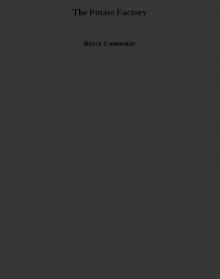 The Potato Factory
The Potato Factory The Power of One
The Power of One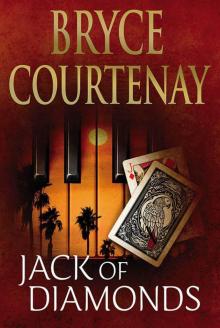 Jack of Diamonds
Jack of Diamonds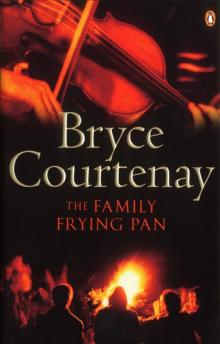 The Family Frying Pan
The Family Frying Pan April Fool's Day
April Fool's Day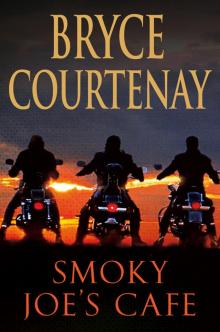 Smoky Joe's Cafe
Smoky Joe's Cafe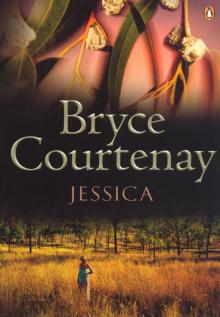 Jessica
Jessica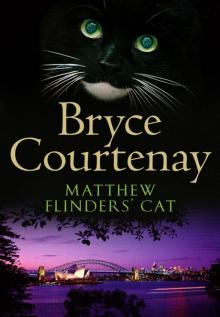 Matthew Flinders' Cat
Matthew Flinders' Cat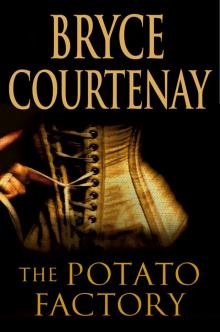 Potato Factory
Potato Factory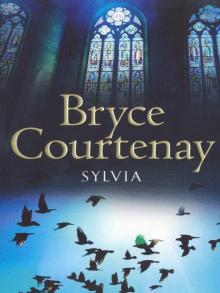 Sylvia
Sylvia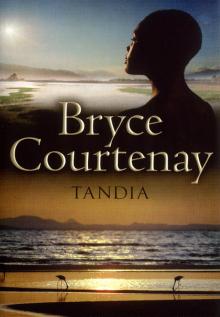 Tandia
Tandia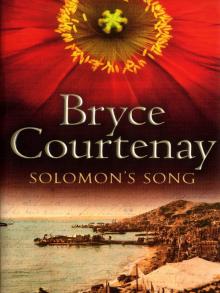 Solomon's Song
Solomon's Song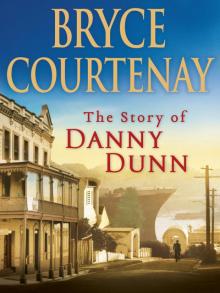 The Story of Danny Dunn
The Story of Danny Dunn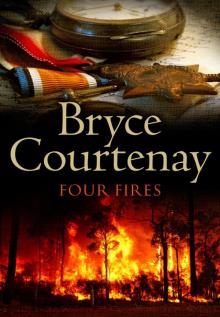 Four Fires
Four Fires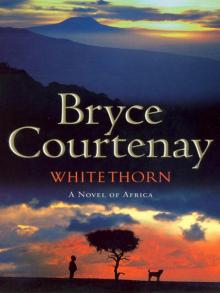 Whitethorn
Whitethorn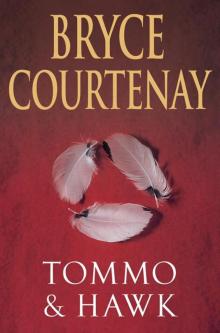 Tommo and Hawk
Tommo and Hawk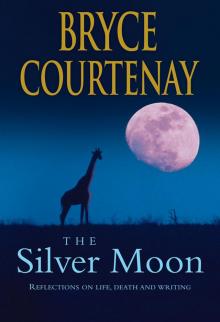 The Silver Moon
The Silver Moon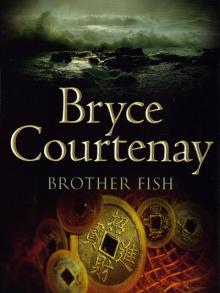 Brother Fish
Brother Fish FORTUNE COOKIE
FORTUNE COOKIE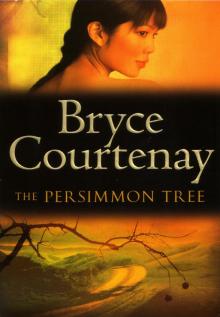 The Persimmon Tree
The Persimmon Tree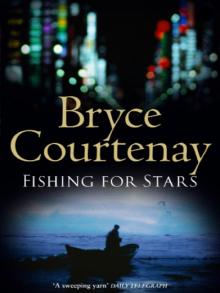 Fishing for Stars
Fishing for Stars